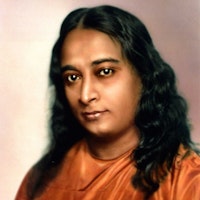Extend all the boundaries of the glowing kingdom of your love, gradually including within them your family, your neighbors, your community, your country, all countries; in short, all living sentient creatures.
Paramahansa Yogananda

The Glowing Kingdom of Your Love
Topic: Love, Compassion, & Kindness
True friendship is broad and inclusive. Selfish attachment to a single individual, excluding all others, inhibits the development of Divine Friendship. Extend all the boundaries of the glowing kingdom of your love, gradually including within them your family, your neighbors, your community, your country, all countries; in short, all living sentient creatures.
Paramahansa Yogananda, born Mukunda Lal Ghosh on January 5, 1893, in Gorakhpur, India, is considered one of the most influential spiritual teachers of the 20th century. From a young age, he showed a deep interest in spirituality, seeking guidance from saints and sages in India. In 1915, after completing his education, he became a monk of the Swami order, taking the name Yogananda, meaning "bliss through divine union." His early work focused on teaching and promoting Kriya Yoga, an ancient meditation practice aimed at self-realization.
In 1920, Yogananda traveled to the United States and established the Self-Realization Fellowship (SRF) in Los Angeles. Through SRF, he shared the philosophy and practices of Kriya Yoga, bridging Eastern spirituality with Western culture. His Autobiography of a Yogi, published in 1946, remains one of the most widely read spiritual texts, offering a personal account of his spiritual journey and inspiring readers across the globe.
Yogananda passed away on March 7, 1952, in Los Angeles, after a lifetime devoted to promoting unity among all religions and the transformative power of meditation. The organizations he founded, including SRF and the Yogoda Satsanga Society in India, continue to share his teachings today. His legacy endures through these institutions, and his message of spiritual unity and inner peace continues to inspire millions worldwide.
The Art of Gaining Friends
Yogananda, Paramahansa. The Art of Gaining Friends, Including: Why Love Your Enemies? Inner Culture, 1936.

Paramahansa Yogananda
Theme: Love

About This Paramahansa Yogananda Quotation [Commentary]
Paramahansa Yogananda, Friendship [Excerpt]
Additional Yogananda Quotes
Resources
Related Quotes
Copyright © 2017 – 2026 LuminaryQuotes.com About Us